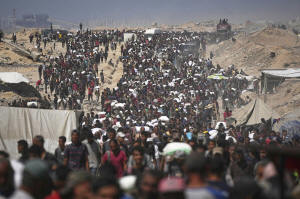For the first time, the world's food crises authority announces a famine
in Gaza
[August 23, 2025]
By SAM MEDNICK and WAFAA SHURAFA
GAZA CITY, Gaza Strip (AP) — The world's leading authority on food
crises said Friday the Gaza Strip's largest city is gripped by famine,
and that it's likely to spread across the territory without a ceasefire
and an end to restrictions on humanitarian aid.
The Integrated Food Security Phase Classification, or IPC, said famine
is happening in Gaza City, home to hundreds of thousands of
Palestinians, and could spread south to Deir al-Balah and Khan Younis by
the end of next month.
The determination comes after months of warnings by aid groups that
Israel's restrictions of food and other aid into Gaza, and its military
offensive, were causing starvation among Palestinian civilians,
particularly children.
Israel rejected the report, with Prime Minister Benjamin Netanyahu
calling it an “outright lie.”
Gaza City offensive could exacerbate hunger
The grim milestone — the first time the IPC has confirmed a famine in
the Middle East — is sure to ramp up international pressure on Israel,
which has been fighting Hamas since the militant group's Oct. 7, 2023,
attack. Israel says it plans to seize Gaza City and other Hamas
strongholds, an escalation experts say will exacerbate the hunger
crisis.
The IPC said hunger has been driven by fighting and the blockade of aid,
and magnified by widespread displacement and the collapse of food
production in Gaza, pushing hunger to life-threatening levels across the
entire territory after 22 months of war.
More than half a million people in Gaza, about a quarter of its
population, face catastrophic levels of hunger, with many at risk of
dying from malnutrition-related causes, the IPC report said.
U.N. Secretary-General António Guterres said the findings show a
“human-made disaster, a moral indictment, and a failure of humanity
itself” and appealed for an “immediate ceasefire.”

Israel disputes the report
Netanyahu denies there's hunger in Gaza, calling reports of starvation
“lies” promoted by Hamas. “The IPC report is an outright lie. Israel
does not have a policy of starvation,” his office posted on X.
The U.S. State Department also sought to cast doubt on the report. It
said the humanitarian situation in Gaza “is a serious concern,” but
blamed Hamas and looters for the difficulties in delivering aid.
After the publication of images of emaciated children in Gaza and
reports of hunger-related deaths in recent weeks, Israel announced
measures to let more humanitarian aid in. Yet the United Nations says
what's entering is far below what's needed.
The Israeli military agency in charge of transferring aid to the
territory, known as COGAT, called the report “false and biased.” It said
significant steps had been taken to expand the amount of aid entering
the strip in recent weeks.
Israel's Foreign Ministry said more than 100,000 trucks of aid have
entered Gaza since the start of the war, including a massive influx in
recent weeks. But experts say Gaza is still reeling from the tightening
of the blockade from early March until mid-May, when Israel barred the
import of all food, medicine and other goods.
“A rapidly increasing number of people, especially young children, are
dying preventable deaths from starvation and disease because Israel made
starvation a core part of its campaign to control the strip,” said Chris
Newton, an analyst for the International Crisis Group.
Netanyahu says more military pressure is needed to achieve Israel’s
goals of freeing the hostages held by Hamas and eliminating the militant
group altogether.
How a famine is determined
Formal famine determinations are rare. The IPC says a famine exists in
an area when all three of the following conditions are confirmed:
At least 20% of households have an extreme lack of food, or are
essentially starving. At least 30% of children 6 months to 5 years old
suffer from acute malnutrition or wasting, based on a weight-to-height
measurement; or 15% of that age group suffer from acute malnutrition
based on the circumference of their upper arm. And at least two people,
or four children under 5, per 10,000 are dying daily due to starvation
or the interaction of malnutrition and disease.

[to top of second column]
|

Palestinians carry sacks of flour taken from a humanitarian aid
convoy in the outskirts of Beit Lahiya, northern Gaza Strip, Aug. 1,
2025. (AP Photo/Jehad Alshrafi, File)

The data analyzed between July 1 and Aug. 15 showed clear evidence
that thresholds for starvation and acute malnutrition have been
reached. Gathering data for mortality has been harder, but the IPC
said it is reasonable to conclude from the evidence that the
necessary threshold has likely been reached.
The IPC warned that a third of Gaza’s population could face
catastrophic levels of hunger by the end of September, and that this
is probably an undercount.
Alex de Waal, author of “Mass Starvation: The History and Future of
Famine” and executive director of the World Peace Foundation, said
that had Israel allowed the IPC better access to collect data, a
famine might have been determined months ago, which would have
raised global awareness sooner.
“It seems that it’s necessary for experts to shout ‘famine!’ before
the world takes notice, by which time it is too late,” he said.
Israel has restricted aid to varying degrees throughout the war. It
says there’s currently no limit on how many aid trucks can enter
Gaza. It also pushed ahead with a new U.S.-backed aid delivery
system that requires Palestinians to travel long distances and pass
through Israeli military lines to get aid.
The traditional, U.N.-led aid providers say deliveries have been
hampered by Israeli military restrictions and incidents of looting,
while criminals and hungry crowds overwhelm entering convoys.
Witnesses, health officials and the U.N. rights office say hundreds
of people have been killed by Israeli forces while seeking aid from
both providers, while Israel says it has only fired warning shots
and that the toll is exaggerated.
A parent in Gaza City watches his children waste away
On the eve of the war, Gaza City was home to some 700,000 people,
about the population of Washington.
Throughout the conflict, it has been the focus of regular Israeli
bombardment and ground operations. Several neighborhoods have been
almost completely destroyed. Hundreds of thousands fled under
Israeli evacuation orders at the start of the war but many returned
during a ceasefire earlier this year.
Doctors and nurses in Gaza in recent weeks have seen rising numbers
of visibly malnourished patients.
Kirsty Blacka, an Australian emergency nurse who worked in Gaza
City's Al-Quds hospital through June, said emaciated men with no
preexisting conditions were coming in looking like teenagers because
they were starving.

She said the lack of food has been compounded by contaminated water
causing diarrhea and infections, and that diseases are harder to
recover from when people are malnourished. Thousands will be too
weak to evacuate the city ahead of the planned offensive, said
Blacka.
Families in Gaza City say they're watching their loved ones waste
away.
Yousef Sbeteh's two teenage children were wounded by an Israeli
airstrike in June and have spent the last two months in the
hospital. While there, they've both lost weight because there hasn't
been enough food, he said, adding that he can't afford to buy more
because prices at markets have soared. Doctors say the teenagers had
no preexisting conditions.
His 15-year-old daughter, Aya, lost nearly 20 kilograms (44 pounds),
or about 30% of her body weight, according to her doctors. Her
17-year-old brother Ahmad has lost about 15 kilograms (33 pounds).
The lack of nutritional supplements and healthy food is slowing
their recovery, doctors say.
“Doctors say she needs protein, meat and fish,” Sbeteh said while
sitting beside his frail daughter. “But I can't provide that now.”
___
Mednick reported from Tel Aviv, Israel. Associated Press writers
Sally Abou AlJoud in Beirut, Lebanon, and Edith M. Lederer at the
United Nations contributed.
All contents © copyright 2025 Associated Press. All rights reserved |